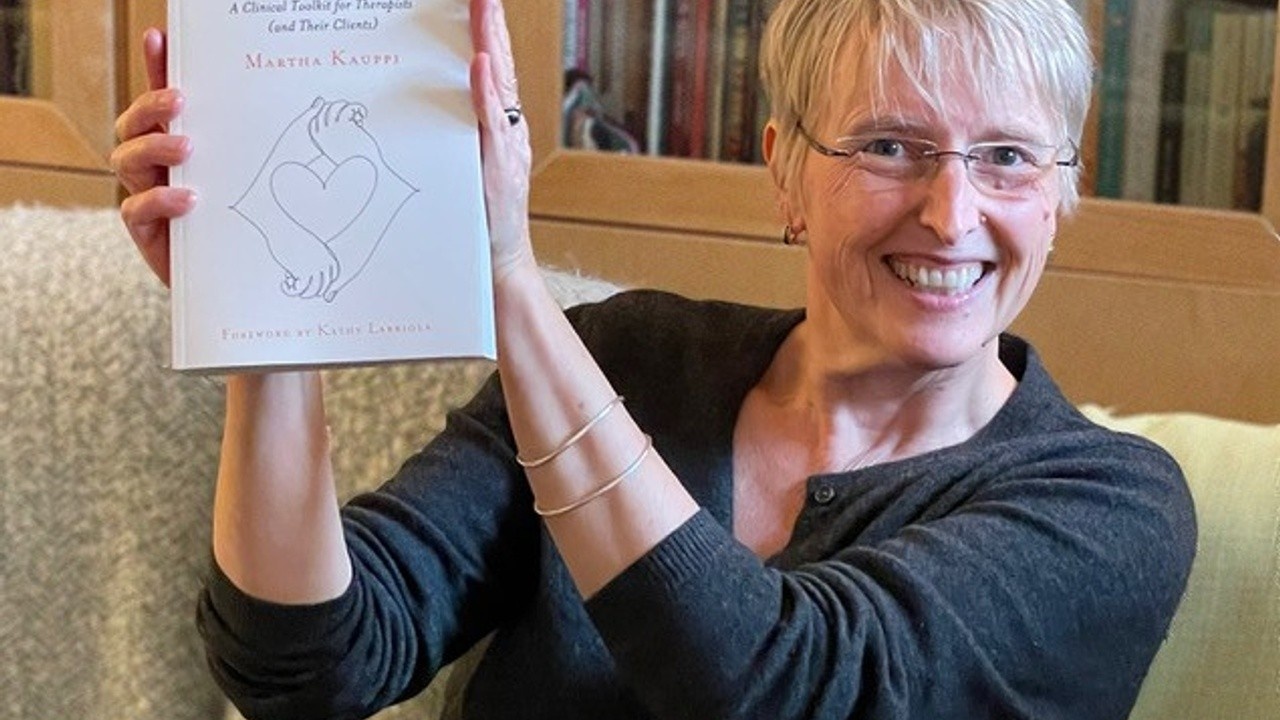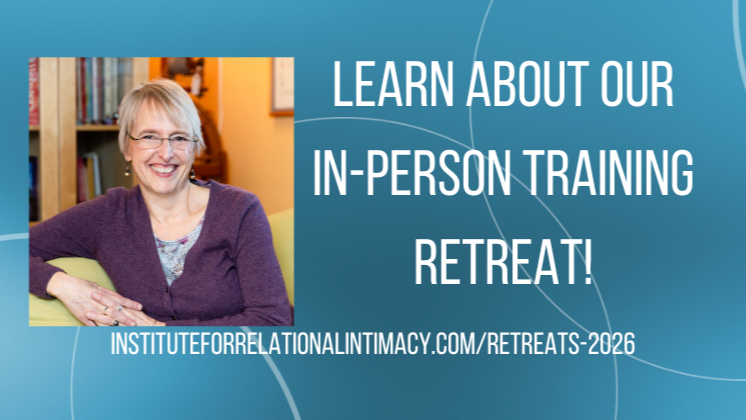What Can We Learn About All Relationships From Polyamory?
May 06, 2021
Hi, welcome back. I’m Martha Kauppi, AASECT-certified sex therapist and supervisor. I am doing a little book launch series here about my brand new book: Polyamory: A Clinical Toolkit for Therapists (and Their Clients). It has a beautiful forward by Kathy Labriola and it has endorsements from Ellyn Bader, Tammy Nelson, Elisabeth Scheff, Justin Lehmiller, and Joe Kort, all of them friends of mine.
I want to talk, today, about what we can all learn about making strong, workable, healthy, secure relationships by looking at polyamorous relationships that work. Who knew that doing a deep dive into working with clinical challenges with polyamory was actually going to take me into writing, what is essentially, a book about how to make all relationships work? It’s sort of next-level, though.
Well, it’s interesting because when I asked therapists, “What are your toughest challenges about polyamory?” so that I can teach, so that I can know what material is going to land and is going to be helpful, mostly what I heard were questions like, “What do I do when one partner wants to open their relationship and their partner doesn’t want to open their relationship?”, “What do I do when I’m working with a couple who had a polyamorous relationship in the past or they opened their relationship for a while, things went badly wrong and now, they want ot try it again but it was really a mess before?”, or “What do I do when people are in polyamorous relationships and they’re breaking their agreements or they don’t know how to make rules that will help them succeed?”
The interesting thing about these kinds of questions is that they’re all relationship questions. They’re not really polyamory questions. Isn’t that interesting? As I was thinking about it, I was thinking, “This isn’t all about polyamory.” We can have a big difference of opinion with our partner about anything. Whether or not to open the relationship is just one out of about a million examples. Do we want to have our elderly parents move in with us? There’s a big one. One partner wants to, one partner doesn’t want to. Let me tell you, with a question that big, it’s a big deal!
That’s a big difference if somebody’s values are telling them that we need to have our elders in our home and somebody else’s mental health concerns, personal privacy concerns, boundaries, and personal needs are saying “Oh my god, no. Our house is only 800 square feet. How are we going to make this work? We have three kids. They’re not all out of the nest yet. How in the heck are we going to make all of this actually work?” That’s a big deal. I would call this “tough dilemmas in relationship therapy”. Whether to open the relationship or not is just another example of a tough dilemma in relationship therapy.
When we’re talking about, “We opened our relationship in the past and things went badly wrong. It was just an absolute disaster. I don’t know if we’ve even recovered from it yet, but one or both of us is still interested in opening our relationship. How would we go about it and do it better?”, this is a repair question. A little bit of that is a polyamory question and.
In every case in all these examples, there’s a little slice of it that is really about polyamory, specifically. To help with it effectively, therapists would have to know that polyamory can work, know that polyamory itself is not the problem, and I think that’s the key. I really know that polyamory itself is not the problem because I’ve seen so much polyamory actually work beautifully. The concept of polyamory is not the problem.
That said, there is a problem for this particular client. If it’s not polyamory, what is it? It turns out that it took me 492 pages to cover that because people have all kinds of relationship difficulties and also, internal dilemmas. Part of a relationship is dilemma—”Do we open or don’t we open?”, “Do we have the parents move in or don’t we have the parents move in?”—boils down to individual dilemmas. A part of me wants to, a part of me doesn’t. A part of me doesn’t and a part of me wants to.
We tend to get polarized with that stuff. One of us goes over here to this opinion and the other one goes over here to this opinion. We push against each other and we get all entrenched. I have some worksheets and some exercises for how to work through a personal dilemma, how to help a couple work through a dilemma between two people, or how to support you as you work through your own dilemma between two people, how to make a good repair, so how to look at what happened in the past and figure out what went wrong with it. I have ways of thinking. As a therapist, I have ways of conceptualizing what is going on here, what happened and how to deal with it better.
There are plenty of things that can go wrong with anything and then, there are some things that are relatively likely to crop up with polyamory. One of those is difficult feelings like jealousy. There’s lots and lots in this book about how to deal with difficult emotions. I don’t think jealousy is the issue. I think dealing with difficult emotions is the issue.
If you can see what I’m doing here, instead of getting bogged down in the little details about this word or that emotion or this relationship form, I’m zooming out a little bit and saying that I think the skills you need to work with jealousy well are not that different from the skills you need to work with anxiety well, not that different from the skills you need to work with anger well. It’s all emotions and it’s all the juicy, messiness of life and how to handle all of that incredible complexity, and beauty, and messiness in a way that helps you create the life that you want and the relationship that you want.
This is what I think we can learn from people who are in polyamorous relationships. I think we can learn that relationship skills are very important to having a healthy self and healthy relationship. We want healthy relationships and we shy away from the hard stuff. If you’re shying away from, for instance, tackling a real difference of opinion about something big between you and your partner, maybe you want to tackle that. That’s one thing we can learn from people who have opened their relationship. They had some hard conversations. They talked about it, they figured it out, they made a plan, they ran some experiments, they moved forward, and then they hammered it out as they went along, and they figured out how to make it work. That’s an incredible, beautiful thing and I really believe that you can do that about the differences between you and your partner as well.
Also, people in polyamorous relationships porbably have dealt with some uncomfortable feelings. Most of them have. We can learn something, for sure, about not shying away from situations that create emotions and instead, figuring out how to deal with the actual emotions better. What a beautiful lesson, and one that really we deserve some support for because it’s not an easy prescription.
And, some messy stuff happened in the past? Yes, in every relationship, right? In every life some messy stuff happened in the past. Now, how do we move forward into the future that we want, being the person that we want, the partner that we want to be? How do we bring that all forward and make a really good, deep, rock-solid repair so that we can build something strong that is exactly what we want and what our partner wants?
I think we can learn a ton. If you’re just a regular old monogamous person, or you’re an asexual person, or you’re a person who’s not interested in being in a relationship right now, you still might find something that will benefit you in this book because there are 25 personal growth worksheets. There’s a lot in here.
I’ll be interested to hear your thoughts. I’m dying to get some feedback about this book and thank you so much for listening. The next thing I’m going to talk about in my fourth vlog in this series is: “What about secure attachment and a secure bond in a polyamorous relaitonship? Is that even possible?” I’ll be right back!
Available On: Amazon, Independent Seller, Rowman.com, International: Blackwells, Waterstones, UK Bookshop






